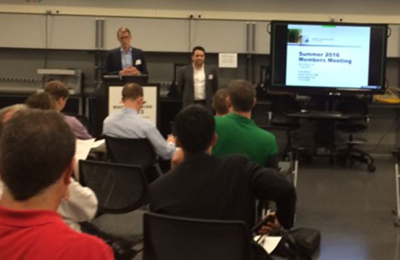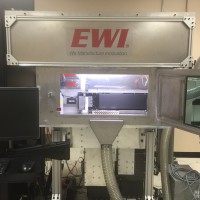

The specific goals of the AMC are to: 1) foster technical interchange by presenting timely case studies and current research efforts at quarterly meetings, 2) execute group-sponsored, pre-competitive research projects within the AMC, 3) collaborate on government funding opportunities, and 4) provide a forum for discussing and shaping industrial and government roadmaps that define future funding.
In the past year, the AMC doubled the number of full members in the U.S., Europe, South America, and Asia. As of June 2017, the AMC has 41 members, all users of AM technology.
The AMC project portfolio continues to focus on addressing common, pre-competitive technical challenges in metal AM processes. Projects are focused on materials and processes. Members have access to $2.2 million in project funding. Past projects have included Inconel 625, Inconel 718, and Monel 400 theme development, heat treatment optimization, machine variability, and design allowable database generation. Some of the AMC efforts funded in 2017 include:
- Nondestructive Post-process Evaluation (NDE) of AM Parts. The AMC project will investigate four common NDE techniques – ultrasound (UT), eddy current (ET), pulsed thermography (PdTh), and computed tomography (CT) for examination of laser powder bed fusion (L-PBF) Inconel 625 (In625) specimens with pre-designed imbedded defects for technology qualification.
- AM Powder Recycling and Reconditioning for L-PBF. The AMC project will focus on two aspects of powder reconditioning: 1) using Tekna’s plasma induction system to improve morphology and evaluate effects on chemical composition of the powder, and 2) blending used and virgin powder in varying proportions to evaluate its effect on powder reconditioning.
- In-process Monitoring and Rectification of Defects in L-PBF. The AMC project will focus on the development of methods for in-process detection and rectification of open-to-surface defects in L-PBF processes. EWI will take advantage of their previous work that consists of over three years and over 2.5 million dollars of government and internal funding.
- High-strength Aluminum Alloys for L-PBF. A project was initiated to develop laser-based powder bed fusion process parameters for high-strength aluminum alloys. The AMC will execute a test program to evaluate and develop build parameters for aluminum alloy materials with properties equivalent to 7000 series aluminum alloys.

An annual project contribution is required to participate in meetings and fund project work. Four tiers of membership are available for end users, non-profit, small business and supplier, and university and government research partners. See more information on the AMC here.
